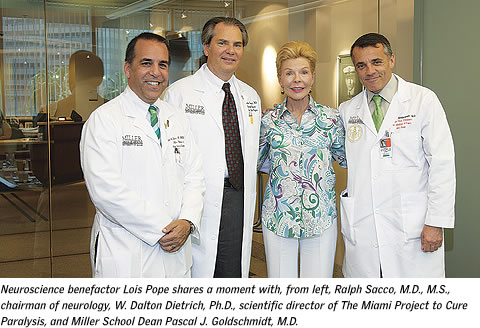To most people,
the late actor Christopher Reeve was the embodiment
of Superman, a character Reeve skillfully brought to
life in a series of films.
To Palm Beach resident
Lois Pope, Reeve was “Chris,” a
quick-witted, kindhearted friend she used to jog along
the beach with. The horseback riding accident that rendered
Reeve a quadriplegic is one of the main reasons Pope
offers financial assistance to students in the Miller
School’s Neuroscience Graduate Program.

Several Lois Pope
LIFE Fellows recently met with Pope in the lobby of
the building bearing her name, the Lois
Pope LIFE Center. It was a tossup as to who was more
excited—the group of students about to meet their
program’s major benefactor or Pope, a philanthropist
who exudes a passion to improve neurological research
and medicine.
“I wanted
to know what was being done for people like Chris,” says
Pope, who’s made a $10 million
commitment to the Miller School to advance the study
of neurological diseases. “It’s a horrible
thing to feel that you’re helpless and you can’t
help a dear friend.”
Pope felt the same
frustrating swirl of emotions when her mother suffered
a stroke that eventually led to her
death. Consequently, the Lois Pope LIFE Center has
laboratories actively seeking ways to mitigate the
devastating impact
strokes can have on the nervous system and the brain.
In addition to
giving the medical school a top-notch facility to study
all kinds of neurological maladies—not
just paralysis—Pope wanted to ensure that plenty
of bright neurological researchers are in the Miller
School pipeline. Students typically go through the Neuroscience
Graduate Program in four or five years, leaving with
a Ph.D. in neuroscience.
Some of the fellows
that Pope recently met concentrate on spinal cord injuries
and the regrowth of neurons—exactly
the kind of research that would have benefited Reeve,
who was paralyzed in 1995 and died nine years later.
Pope’s involvement with the Neuroscience Graduate
Program is significant on several levels, fellow Lana
Jones observed while waiting for her arrival at the Lois
Pope LIFE Center. “Among other things, it’s
important for me to meet her because she’s a woman,” Jones
said. “It’s always nice to see women associated
with science, in whatever capacity.”
At present there
are 31 Lois Pope LIFE Fellows, according to Neuroscience
Graduate Program Director Charles Luetje,
Ph.D. “Lois Pope’s support for graduate education
helps with the cost of providing $23,000 annual stipends
to the Lois Pope LIFE Fellows,” notes Luetje. “Mrs.
Pope has given us the ability to dramatically expand
the program and attract high-quality students.” |